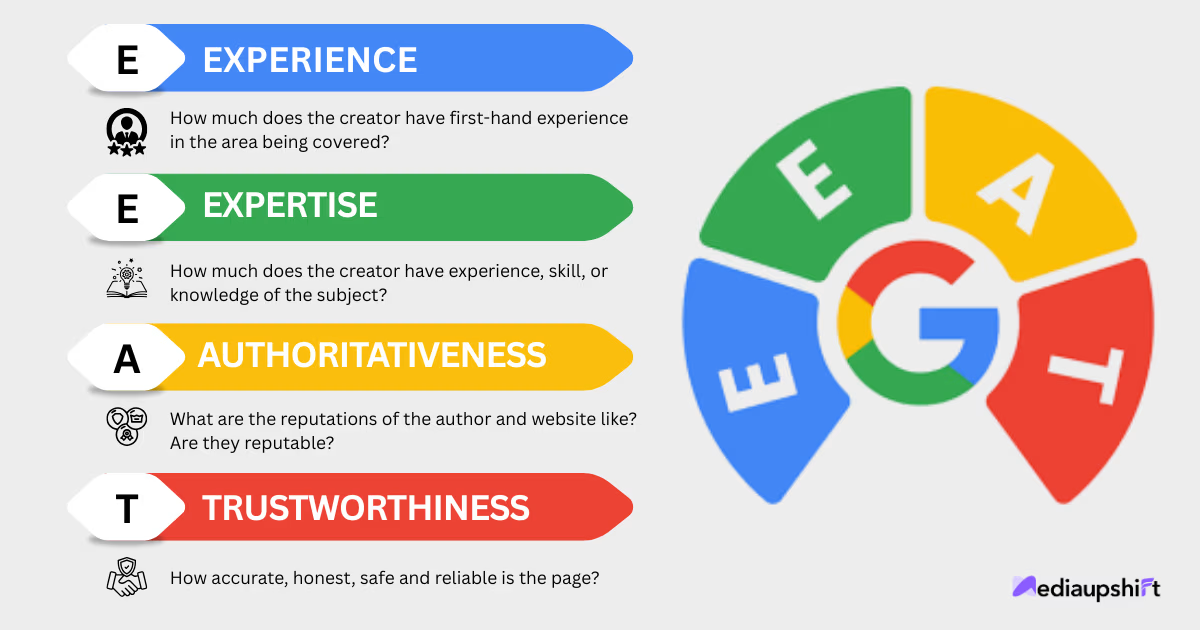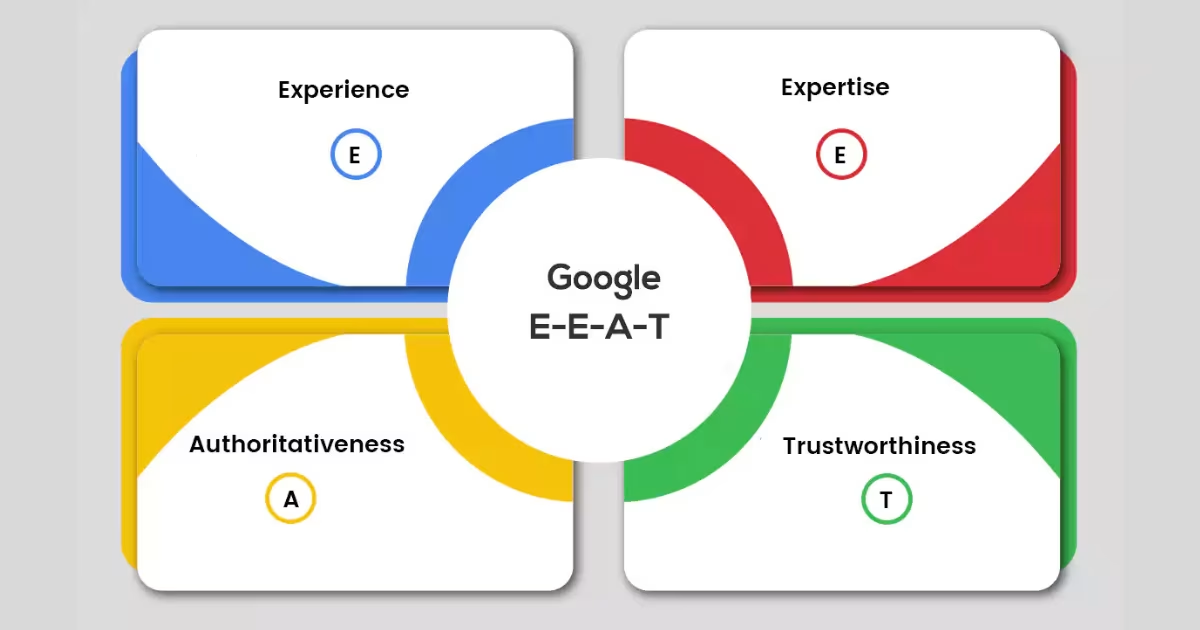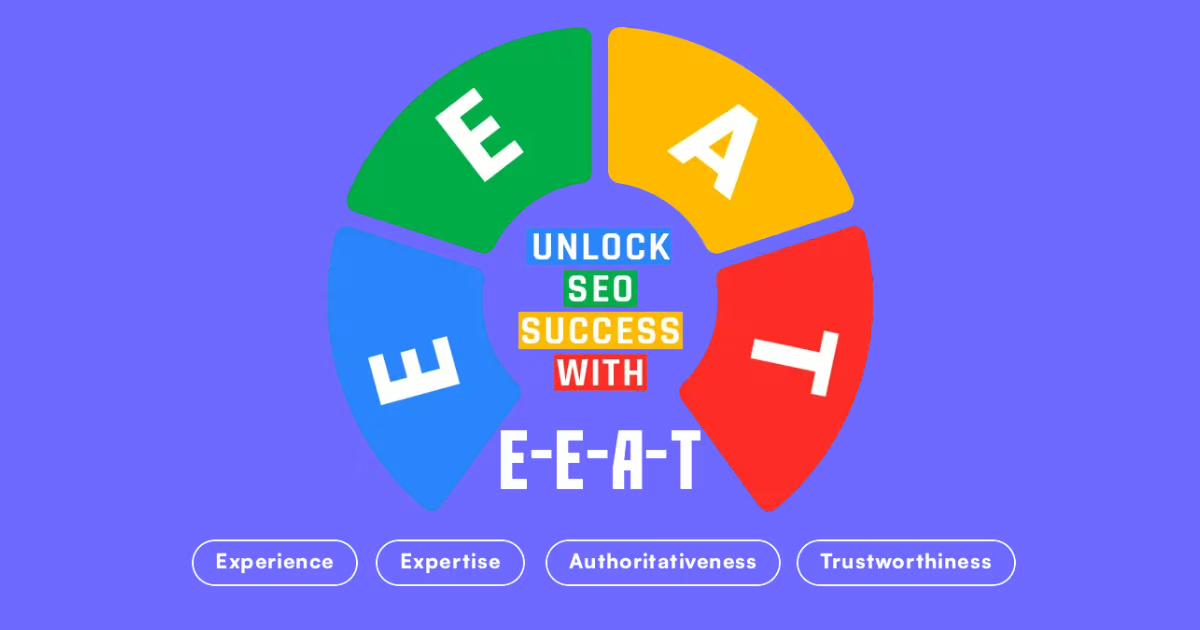What Is E-E-A-T in SEO? A Complete Guide
Published on: 18 Sep, 2025

Introduction
If you want to rank well on search engines in the year 2025, you have got to create content that users will trust and understand. This is why nowadays, E-E-A-T plays a great role as it is a great framework which is used to evaluate the quality of content and also determine which pages need to rank well. E-E-A-T full form is Experience, Expertise, Authoritativeness, and Trustworthiness.
As a creator, blogger, and a digital marketing agency, it is essential to understand what is E-E-A-T in SEO that improves a website’s credibility, match standards of Google, and follow SEO best practices. For example, if you are writing an article on health, finance, technology, or lifestyle, then showing expertise, recognized authority, and trustworthiness can significantly decide how your content will rank.
Using E-E-A-T SEO principles makes sure that your website looks reliable and valuable to users and also to search engines. By following best SEO practices, you can easily increase your website’s reputation, engage your audience, and build long-term visibility in search results.
Understanding the meaning of E-E-A-T
E-E-A-T SEO is giving signals to Google that your content is credible, accurate, and created by an expert. Now we will explore all the parts in full detail:
1. Experience
Experience is the first and knowledge or practical involvement the creator of the content has with the topic itself. Google gives priority to content that comes from someone who has engaged with the subject already and has significant knowledge about it.
- Share personal insights: Include real-life examples or stories to show that you have actual knowledge about what you are writing.
- Use case studies or examples: Show results, observations, or outcomes that come from personal experiences.
- Practical tips: Offer actionable advice which is based on your direct experience rather than generic information.
Example: A travel blogger who writes about local food in Italy based on his/her personal visits will demonstrate solid experience.
2. Expertise
Expertise shows that a creator has knowledge and qualifications in that particular field. Google appreciates and rewards content which is written by someone who is recognized as an expert.
- Qualifications and certifications: Mention degrees, certifications, or professional experience.
- Detailed, accurate content: Provide in-depth explanations, statistics, or instructions that reflect nice knowledge.
- Relevant professional background: Show work experience related to the topic to gain trust and credibility.
Example: Health articles written by certified doctors or financial advice given by licensed professionals show high expertise.
3. Authoritativeness
Authoritativeness is recognition from other people that are in your industry or niche. When reputable sources support your content, then it shows authority to Google.
- Citations and backlinks: Get mentions from reputable websites, blogs, or media outlets to gain credibility.
- Collaborate with experts: Partner or collaborate with famous professionals for content creation or reviews.
- Show awards or achievements: Display honors or recognitions to show your authority.
Example: If a tech review site is referenced by major tech publications then it will demonstrate strong authoritativeness.
4. Trustworthiness
Trustworthiness makes sure that your content is safe, accurate, and transparent. Users need to feel confident that your information is reliable.
- List credible sources: Show reference of authoritative studies, reports, or websites.
- Provide clear author info: Include bios, contact info, and credentials to look trustable.
- Website security: Use HTTPS, privacy policies, and secure user interactions.
- Provide accurate and transparent content: Avoid exaggerating things or adding any misleading claims.
Example: Articles that give financial advice and clearly list government regulations or verified studies will help in increasing your trustworthiness.
If you put your focus on these four pillars of EEAT meaning- Experience, Expertise, Authoritativeness, and Trustworthiness, you can significantly improve your E-E-A-T SEO, align with SEO best practices, and increase your chances of ranking higher in Google search results.
E-E-A-T vs. E-A-T: What’s Changed?

You must have heard of E-A-T before, which means Expertise, Authoritativeness, and Trustworthiness. But In 2022, Google provided Experience to be a new part, and officially updated the word to E-E-A-T.
This addition of another “E” shows the importance of firsthand knowledge and practical involvement in the topics you write about. Let us see what this change means for content creators and why it matters for E-E-A-T SEO.
Why ‘Experience’ Was Added
- Authenticity matters: Google now gives priority to content which is created by someone who has personally engaged with the topic before.
- Better content quality: Showing personal experience will help your content to become more detailed, accurate, and actionable.
- Better user satisfaction: People trust content which is written using personal experience and not just by doing general research.
Example: A DIY home improvement blog which is written by someone who has actually completed the projects will perform better than a guide which is written by looking at other sources..
Implications for Content Creators
- Show real-life experience: Include stories, examples, and practical insights.
- Focus on authenticity: Avoid content that only summarizes information by looking at other sources rather than putting any original input.
- Enhance your website’s authority: It is great to combine experience with expertise, authoritativeness, and trustworthiness as it helps to strengthen your overall E-E-A-T SEO profile.
In summary, the adding of Experience in E-A-T has made content strategies look more authentic, practical, and user-focused. By following these strategies you can ensure the alignment of your content with the best SEO practices and Google’s standards of quality.
Why E-E-A-T Matters for SEO
Many people think if E-E-A-T in SEO is a direct ranking factor or not. The simple answer is: No, it’s not. Google does not give your website a rating for E-E-A-T. But it still plays a huge role in how your content ranks in search results. Let us see how.
1. Google’s Guidelines
Google has people called quality raters who check search results who don’t decide your rankings, but their feedback helps Google to improve its systems. In these guidelines, E-E-A-T SEO is very crucial.So, if your content shows experience, expertise, authority, and credibility, then it has more chances of matching Google’s idea of “high-quality content.”
2. Indirect Impact on Rankings
Even though E-E-A-T in SEO is not a direct ranking factor, it still affects the criteria that Google considers, like:
- User engagement: Are readers staying and reading your content?
- Bounce rate: Are they leaving quickly, or do they keep browsing?
- Loyalty: Are they coming back to your site again?
Good E-E-A-T makes sure that people trust your content, stay for a longer time, and then return also. This is what tells Google that your site is of great value.
3. Extra Important for YMYL Topics
If you are writing about sensitive topics like health, finance, or law (called YMYL – Your Money or Your Life), then you should be very careful as Google is strict about them. Wrong information on these topics could hurt people. This is why while writing on these topics, you should have and also show strong experience, expertise, authority, and trust.
Example: A health blog written by a doctor with proper references will rank higher than the one which has no sources or credentials.
In short, E-E-A-T matters for SEO because it helps to build trust with both readers and search engines. And we all are aware that trust is at the center of all SEO practices.
How to Improve E-E-A-T on Your Website

Improving E-E-A-T SEO is not just about tricks, it is also about building real trust with your readers and showing Google that your site is credible and trustworthy. Here are some easy ways to do it:
- Show Author Credentials
- Add author bios with details like education, experience, or work background.
- Link to professional profiles (LinkedIn, portfolios, etc.).
- Mention any awards or achievements.
- Use Trusted Sources
- Always link to credible sites, research papers, or official data.
- Avoid weak or random sources that lower trust.
- Fact-check everything before publishing.
- Keep Content Updated
- Old or outdated info makes readers lose trust.
- Regularly update articles with new data, fresh statistics, or recent examples.
- Remove broken links or outdated references.
- Secure Your Website
- Make sure your website uses HTTPS (shows the lock).
- Add clear privacy policies and terms.
- If you sell products, ensure you have safe payment options.
- Engage with Your Readers
- Allow comments, reviews, or feedback.
- Reply to questions or concerns shared by people as soon as possible.
- Show your audience that you care about them.
- Add Real Experience to Your Content
- Share personal stories or examples.
- Use case studies or client results whenever possible.
- Write in a way that sounds real and not robotic.
By following these SEO practices, your rankings will improve and you will also be able to build long-term credibility. If you stay consistent by using these practices, then your website will become a credible resource in your field.
Conclusion
In conclusion, E-E-A-T in SEO is mostly about trust. Google wants to show content that comes from real experience, true expertise, recognized authority, and trustable information. And If your website can prove these things, then people will trust you more and so will the search engines.
If you write about travel, food, finance, or health, adding personal insights, then you should know that showing credentials, and keeping your content updated makes a huge difference. These steps are not just SEO best practices, they’re also what keep readers coming back.
So, when someone asks you, “What is E-E-A-T in SEO?”, you should know the simple answer that- it is the way to make your website credible, useful, and successful in the long run.
Frequently Asked Questions
1. What is E-E-A-T in SEO? E-A-A-T meaning is Experience, Expertise, Authoritativeness, and Trustworthiness. It is a smart way for Google to check if your content is reliable, accurate, and trustworthy. They also check if it is written by someone who has real knowledge or expertise with the topic.
2. Why is E-E-A-T important for SEO? E-E-A-T helps search engines decide which websites are providing trustworthy content. Having strong E-E-A-T improves your website’s credibility and helps boost your ranking.
3. How can trustworthiness be increased for a website? You can easily increase trustworthiness by using HTTPS, showing author details, adding credible sources, publishing accurate content, and also by being transparent about the business policies.
4. Why is E-E-A-T important for YMYL websites? Topics of YMYL-Your Money or Your Life like health, finance, or safety ask for extra care and attention, because Google pays more attention to such topics. By having a strong E-E-A-T, it ensures that people get safe and trusted content.